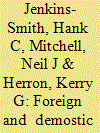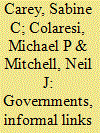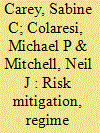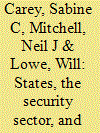|
|
|
Sort Order |
|
|
|
Items / Page
|
|
|
|
|
|
|
| Srl | Item |
| 1 |
ID:
052819


|
|
|
| 2 |
ID:
141183


|
|
|
|
|
| Summary/Abstract |
From Syria to Sudan, governments have informal ties with militias that use violence against opposition groups and civilians. Building on research that suggests these groups offer governments logistical benefits in civil wars as well as political benefits in the form of reduced liability for violence, we provide the first systematic global analysis of the scale and patterns of these informal linkages. We find over 200 informal state–militia relationships across the globe, within but also outside of civil wars. We illustrate how informal delegation of violence to these groups can help some governments avoid accountability for violence and repression. Our empirical analysis finds that weak democracies as well as recipients of financial aid from democracies are particularly likely to form informal ties with militias. This relationship is strengthened as the monitoring costs of democratic donors increase. Out-of-sample predictions illustrate the usefulness of our approach that views informal ties to militias as deliberate government strategy to avoid accountability.
|
|
|
|
|
|
|
|
|
|
|
|
|
|
|
|
| 3 |
ID:
068735


|
|
|
| 4 |
ID:
101623


|
|
|
|
|
| Publication |
2010.
|
| Summary/Abstract |
We examine the commitments of transnational corporations to human rights, labor, environmental, and anti-corruption standards. Modeling commitment as a function of the nature of the firm's business activities and conditioned by neighborhood and audience contexts, we investigate adherence to the principles entailed in the UN Global Compact program by the world's 2000 largest companies. Our results suggest that the decisions to participate in and to take steps to comply with the Global Compact are influenced by the characteristics of the firm as it adapts to its institutional and political environment. Signing up to the program increases the likelihood of firms developing human rights-related company policies and receiving positive external assessments of their performance.
|
|
|
|
|
|
|
|
|
|
|
|
|
|
|
|
| 5 |
ID:
146183


|
|
|
|
|
| Summary/Abstract |
In Thailand, India, Libya, and elsewhere, governments arm the populace or call up volunteers in irregular armed groups despite the risks this entails. The widespread presence of these militias, outside the context of state failure, challenges the expectation that governments uniformly consolidate the tools of violence. Drawing on the logic of delegation, we resolve this puzzle by arguing that governments have multiple incentives to form armed groups with a recognized link to the state but outside of the regular security forces. Such groups offset coup risks as substitutes for unreliable regular forces. Similar to other public-private collaborations, they also complement the work of regular forces in providing efficiency and information gains. Finally, these groups distance the government from the controversial use of force. These traits suggest that militias are not simply a sign of failed states or a precursor to a national military, but an important component of security portfolios in many contexts. Using cross-national data (1981–2005), we find support for this mix of incentives. From the perspective of delegation, used to analyze organizational design, global accountability, and policy choices, the domestic and international incentives for governments to choose militias raise explicit governance and accountability issues for the international community.
|
|
|
|
|
|
|
|
|
|
|
|
|
|
|
|
| 6 |
ID:
121801


|
|
|
|
|
| Publication |
2013.
|
| Summary/Abstract |
This article introduces the global Pro-Government Militias Database (PGMD). Despite the devastating record of some pro-government groups, there has been little research on why these forces form, under what conditions they are most likely to act, and how they affect the risk of internal conflict, repression, and state fragility. From events in the former Yugoslavia, Iraq, Sudan, or Syria and the countries of the Arab Spring we know that pro-government militias operate in a variety of contexts. They are often linked with extreme violence and disregard for the laws of war. Yet research, notably quantitative research, lags behind events. In this article we give an overview of the PGMD, a new global dataset that identifies pro-government militias from 1981 to 2007. The information on pro-government militias (PGMs) is presented in a relational data structure, which allows researchers to browse and download different versions of the dataset and access over 3,500 sources that informed the coding. The database shows the wide proliferation and diffusion of these groups. We identify 332 PGMs and specify how they are linked to government, for example via the governing political party, individual leaders, or the military. The dataset captures the type of affiliation of the groups to the government by distinguishing between informal and semi-official militias. It identifies, among others, membership characteristics and the types of groups they target. These data are likely to be relevant to research on state strength and state failure, the dynamics of conflict, including security sector reform, demobilization and reintegration, as well as work on human rights and the interactions between different state and non-state actors. To illustrate uses of the data, we include the PGM data in a standard model of armed conflict and find that such groups increase the risk of civil war.
|
|
|
|
|
|
|
|
|
|
|
|
|
|
|
|
|
|
|
|
|